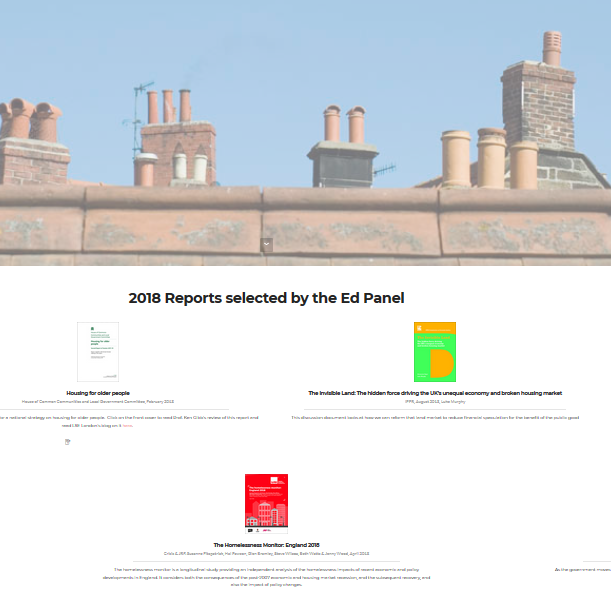The publication of the political party manifestos should have been a welcome moment for clear thinking and radical ideas on how to alleviate the housing crisis. Instead what we have, with a few exceptions, are aspirational promises with little on how they can be achieved and lots of tinkering around the edges of the major issues.
The big stories are those that have been signalled for months: getting the numbers up; helping first time buyers; implementing a Mansion tax; and helping private tenants through regulation.
Supply, supply, supply
All the major parties promise to build more homes – or more precisely to oversee the building of additional stock by the private sector. Labour has pledged to implement parts of the Lyon’s review, specifically through the introduction of a New Homes Corporation, additional help to small builders and a rather vague promise to invest the ‘billions saved in Help to Buy ISAs in increasing supply’. The overall aim is 200,000 homes a year by 2020 – nothing like identified requirements. The Conservatives make no new promises on overall numbers but will push forward their Help to Buy Scheme and provide an additional 200,000 starter homes on land that would not otherwise have been used for housing. They also have the only London specific proposal – for a London Land Commission. The Liberal Democrats are bolder promising 300,000 new homes per annum and 10 garden cities, some provided via direct commissioning like the development in Northstowe. UKIP promise 200,000 per annum but exclusively on brownfield land thus not upsetting their middle England constituency. The Greens pledge is for increasing the supply of socially rented homes by 500,000 in the lifetime of the Parliament by ramping up the social housing budget from £1.5 billion to £6 billion a year and removing the borrowing cap from Local Authorities.
London is currently running a bit ahead of the Mayor’s London Plan in terms of planning permissions and starts but will need a real step change to maintain the impetus over the next Parliament. Little in the manifestos suggests how any of these promises are to be achieved. And where there is detail it mainly helps aspirational homeowners outside London – for instance the 20% discount proposed for the starter home initiative would not bring housing into the reach of most first time buyers in London.
Regulation and reform in planning
Blessedly none of the parties call for yet another major overhaul to the planning system, which has seemingly been in a perpetual state of reform and renewal since the 2004 legislation. The Liberal Democrats do suggest a review of compulsory purchase powers which is something that has come up regularly as a necessary element in accelerating supply. In particular the right of local authorities to use CPOs to assemble land for Housing Zone-type development alongside reforms on compensation rules better to distribute the benefits would be highly desirable.
None of the major parties have had the courage to go anywhere near enabling the strategic release of greenbelt land or even how to have a rational discussion on how to generate win-win outcomes. The Labour Party pledges to implement ‘use it or lose it’ planning permissions, a policy which both planners and developers see as unworkable and likely to slow down development on large sites as it ignores the complexities involved in bringing a site to completion. Underlying this and many of the other suggestions is an assumption that planners can take on more and more responsibilities even though everyone agrees that they have inadequate resources to deal with the basic role of helping to bring sites forward to development. A particular instance here is the Government’s new policy on starter homes which appears to place the burden of policing affordability and onward sales on planners as part of the associated planning obligations. In already understaffed departments it is our view that this additional layer of commitments will do nothing to help planners and developers focus on the real work of bringing forward sites.
A Mansion tax – or a sensible approach to taxing housing values?
No one wants to talk about reforming council tax. However, any rational view of the system highlights its inconsistencies and unfairness. Currently all properties valued at over £320,000 (based on 1991 valuations!) pay the same tax in the same locality – and a property valued in this top band only pays three times as much as one in the bottom band (under £40,000). This approach not only leaves increasing property values virtually untaxed but is also is highly regressive. Indeed households in more expensive properties may well be paying less in money terms than when the system was brought in over 20 years ago. The one offer at remedying this is given by Labour in its populist and misguided Mansion Tax which would only impact on a very small number of households in homes valued over £2m. This limits the political damage to a few areas in central London where they don’t vote Labour anyway. It also helps the Scots Nats who say tax London to help Scotland. Instead what is needed is a government with the courage to charge all higher valued properties more by adding additional bands to the existing council tax band system – something which is, to give them credit, supported by the LibDems.
Regulating the private rented sector
The main suggestions here are variations on a longer term tenancy plus indexation of rent increases within that tenancy. Many of the sector’s major investors already operate in other countries with similar policies, so these changes would not necessarily deter institutional investment in the private rented sector – as long as the detail can be resolved quickly. But the concern must be that it will generate uncertainties both about how it will be implemented but also about the possibility that further regulation will follow – for instance the Greens are looking for caps not indexation. Our research shows that investors avoid uncertainty like the plague.
Will any of this truly increase supply?
Our HEIF project is about increasing the supply of new housing in London. As written in the Manifestos it is hard to imagine any of these policies truly cracking open the problem of housing undersupply. There is too little detail, too little political will and too little real financing to bring any of this into action.
photo credit: secretlondon123 (flickr)




